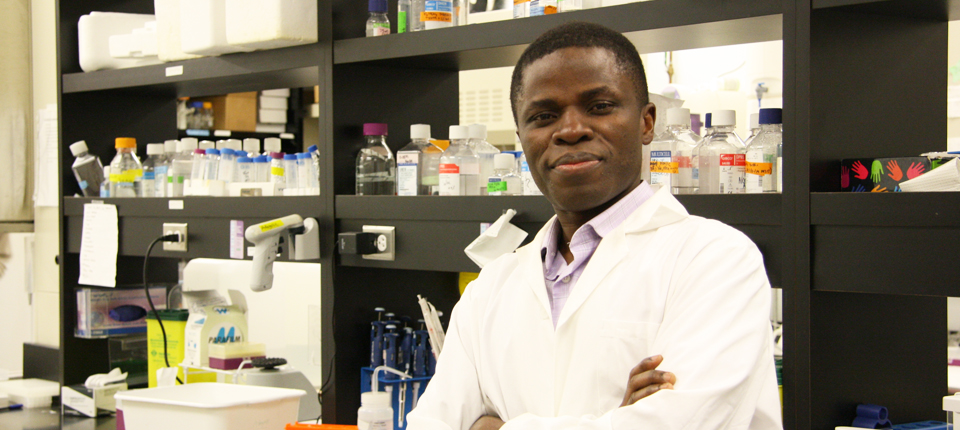What can we do to optimize people’s nutrition and physical activity and how will it affect their health outcomes?
Diet is one of a few malleable factors in our health, which is what draws Ola Adegoke to research on the links between nutrition and human health. With a specific focus on how dietary proteins affect skeletal muscles, in healthy individuals as well as in those with diseases like cancer or diabetes, he wants to produce new knowledge that will help give people more control over their health. The fact that everyone responds differently to diet interventions makes this work challenging, but also forces him and his students to think creatively to answer their research questions.
Inspiration
The first thing that inspires me is the thrill of discovery. I have always wanted to find out how things work.
I’m intrigued by the idea that nutrition is a big component of whether family history translates the risk of diseases such as cardiovascular disease or diabetes into reality. How can we manipulate nutrition to decrease the risk? I also want to understand how dietary protein affects skeletal muscles. Bones give us structure, but we need muscles to work with the bones for movement. Skeletal muscles are involved in the motion business, and that is fascinating to me.
Impact
An aspect of our work looks at the way dietary proteins – whether from animal products like beef, pork or poultry, or from plants like soybean and black bean – regulate how our muscles grow. The benefits that we derive from having bigger muscles don’t stop at just being able to lift heavy weights. We know that in conditions like cancer, the way someone is able to respond to and tolerate treatment is affected by how strong their muscles are. For example, someone with cancer who doesn’t have a lot of muscle mass, or has poor quality of muscle, is unable to take a high dose of chemotherapy. If physicians can’t deliver a dose that is actually going to help kill the cancer cells, the outcome may not be positive.
Highlight
Our research empowers people with the knowledge that your health is, to a very significant extent, under your control. Irrespective of one’s family history, nutrition in combination with physical activity can affect health outcomes.
When I was a postdoctoral fellow, one of the things I studied was muscle wasting from starvation, advanced cancer, or diabetes. We identified one of the enzymes involved in regulating the process of muscle deterioration. Investigators had not typically looked at this enzyme in this context before, and we found that the enzyme works in a unique way. Hopefully, as people research more about that particular enzyme, we will come to a point where we can modify the way the enzyme works and limit the problems associated with loss of muscle mass in these conditions.
What’s Next?
The next big question I’d like to answer is what role nutrition can play in combination with physical activity for older individuals with cancer. The frequency of cancer is higher as people get older, but the basic research done thus far has not been reflective of this age effect. We want to look at the cancer by itself, but also the treatments, because we know that the treatments themselves tend to have a very bad effect on skeletal muscles. Further research may show that different treatment protocols may be beneficial for older adults. If we can address muscle wasting, we may be able to improve quality of life for people being treated for cancer.


